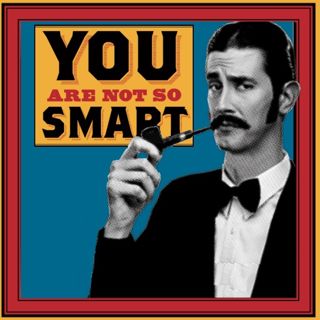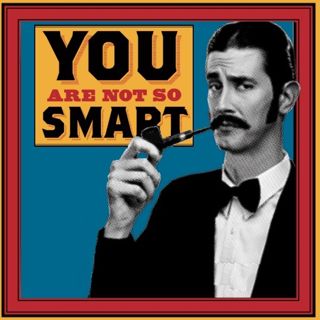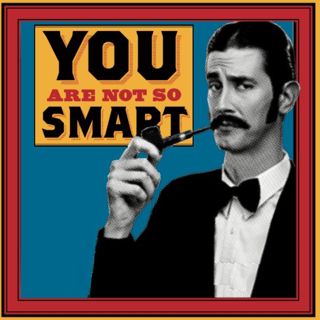
289 - Hack Your Bureaucracy - Marina Nitze (rebroadcast)
Marina Nitze is a professional fixer of broken systems – a hacker, not of computers and technology, but of the social phenomena that tend to emerge when people get together and form organizations, institutions, services, businesses, and governments. In short, she hacks bureaucracies and wants to teach you how to do the same.- Hack Your Bureaucracy- Marina Nitze- How Minds Change- David McRaney’s Twitter- YANSS Twitter- Show Notes- Newsletter - Patreon
10 Juni 202441min

288 - Fluke - Brian Klaas
In this episode we sit down with Brian Klaas, author of Fluke, to get into the existential lessons and grander meaning for a life well-lived once one finally accepts the power and influence of randomness, chaos, and chance. In addition, we learn not to fall prey to proportionality bias - the tendency for human brains to assume big, historical, or massively impactful events must have had big causes and/or complex machinations underlying their grand outcomes. It’s one of the cognitive biases that most contributes to conspiratorial thinking and grand conspiracy theories, one that leads to an assumption that there must be something more going on when big, often unlikely, events make the evening news. Yet, as Brian explains, events big and small are often the result of random inputs in complex systems interacting in ways that are difficult to predict.Previous EpisodesBrian KlaasFlukeHow Minds ChangeDavid McRaney’s TwitterYANSS TwitterNewsletterPatreon
26 Maj 202450min

287 - The Complexity of Genius - David Krakauer and Dean Simonton
In this episode, we are exploring the complexity of the concept of "genius" with two experts on the topic. First you’ll hear from David Krakauer, the president of The Santa Fe Institute, a research institution in New Mexico dedicated to the study of complexity science, and then you'll hear from professor Dean Keith Simonton, one of the world’s leading researchers into the psychological mechanisms and influences that generate the phenomenon we so often refer to as "genius." Previous EpisodesThe Santa Fe InstituteDean K SimontonHow Minds ChangeDavid McRaney’s TwitterYANSS TwitterNewsletter
13 Maj 20241h 4min

286 - Notes on Complexity - Neil Theise
In this episode we sit down with professor Neil Theise, the author of Notes on Complexity, to get an introduction to complexity theory, the science of how complex systems behave – from cells to human beings, ecosystems, the known universe, and beyond – and we explore if Ian Malcolm was right when he told us in Jurassic Park that "Life, um, finds a way."Previous EpisodesNeil Theise's WebsiteNotes on ComplexityConway's Game of LifeThe Santa Fe InstituteTechnosphereHow Minds ChangeDavid McRaney’s TwitterYANSS TwitterNewsletter
29 Apr 202457min

285 - What Do You Mean? - Celeste Kidd (rebroadcast)
Is a hotdog a sandwich?Well, that depends on your definition of a sandwich (and a hotdog), and according to the most recent research in cognitive science, the odds that your concept of a sandwich is the same as another person's concept are shockingly low.In this episode we explore how understanding why that question became a world-spanning argument in the mid 2010s helps us understand some of the world-spanning arguments vexing us today. Our guest is psychologist Celeste Kidd who studies how we acquire and conceptualize information, form beliefs around those concepts, and, in general, make sense of the torrent of information blasting our brains each and every second. Her most recent paper examines how conceptual misalignment can lead to semantic disagreements, which can lead us to talk past each other (and get into arguments about things like whether hotdogs are sandwiches).Previous Episodes Why can’t we settle the “is a hot dog a sandwich?” debate?How Minds ChangeDavid McRaney’s TwitterYANSS TwitterNewsletterCeleste Kidd’s WebsiteCeleste Kidd’s TwitterLatent Diversity in Human Concepts
14 Apr 202448min

284 - Awe - Dacher Keltner (rebroadcast)
In this episode we sit down with psychologist Dacher Keltner, one of the world’s leading experts on the science of emotion, the man Pixar hired to help them write Inside Out. In his new book – Awe: The New Science of Everyday Wonder and How It Can Transform Your Life – he outlines his years of work in this field, the health benefits of awe, the evolutionary origins and likely functions, and how to better pursue more awe and wonder in your own life.Dacher Kelter: https://psychology.berkeley.edu/people/dacher-keltnerGreater Good: https://twitter.com/GreaterGoodSCHow Minds Change: www.davidmcraney.com/howmindschangehomeShow Notes: www.youarenotsosmart.comNewsletter: https://davidmcraney.substack.comDavid McRaney’s Twitter: https://twitter.com/davidmcraneyYANSS Twitter: https://twitter.com/notsmartblog
31 Mars 202454min

283 - Cultures of Growth - Mary C. Murphy
In this episode we welcome psychologist Mary C. Murphy, author of Cultures of Growth, who tells us how to create institutions, businesses, and other groups of humans that can better support collaboration, innovation, performance, and wellbeing. We also learn how, even if you know all about the growth mindset, the latest research suggests you not may not be creating a culture of growth despite what feels like your best efforts to do so. Mary Murphy’s WebsiteCultures of GrowthCarol Dweck at GooglePaper: A Culture of GeniusHow Minds ChangeDavid McRaney’s TwitterYANSS TwitterShow NotesNewsletterPatreon
18 Mars 20241h 5min

282 - They Thought We Were Ridiculous - Andy Luttrell
In 1974, two psychologists, Daniel Kahneman and Amos Tversky, as the New Yorker once put it, "changed the way we think about the way we think." The prevailing wisdom, before their landmark research went viral (in the way things went viral in the 1970s), was that human beings were, for the most part, rational optimizers always making the kinds of judgments and decisions that best maximized the potential of the outcomes under their control. This was especially true in economics at the time. The story of how they generated a paradigm shift so powerful that it reached far outside economics and psychology to change the way all of us see ourselves is a fascinating tale, one that required the invention of something this episode is all about: The Psychology of Single Questions.They Thought We Were RidiculousOpinion ScienceBehavioral GroovesHow Minds ChangeDavid McRaney’s TwitterYANSS TwitterShow NotesNewsletterPatreon
3 Mars 20241h 9min





















